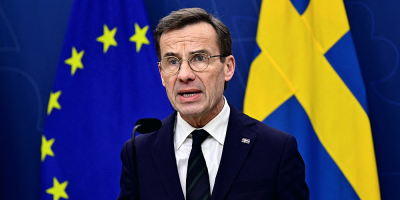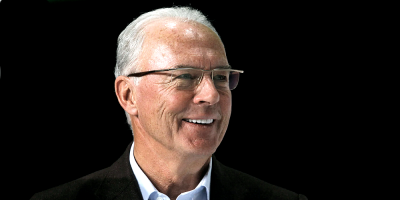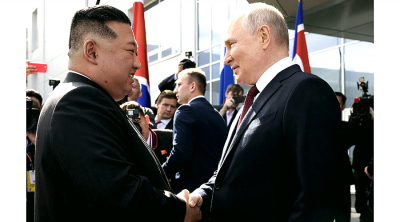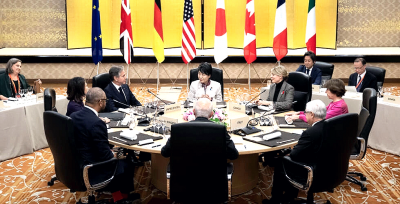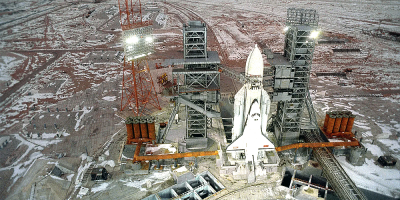FRANKFURT: For over a decade, the Nord Stream 1 pipeline reliably shipped natural gas from Russia to Europe — until the war in Ukraine sent tensions soaring.
As gas flows restarted on Thursday after a nerve-rattling 10-day shutdown, here is a closer look at the pipeline that has come to symbolise Europe’s reliance on Russian energy — especially in Germany.
A success story
The 1,224-kilometre long Nord Stream 1 is a system of twin pipelines running under the Baltic Sea, stretching from Russia’s Vyborg to Lubmin in northeastern Germany. From there, a network of pipelines transports the gas into the European grid.
In use since 2011, Nord Stream 1 can ship 55 billion cubic metres of gas per year, making it one of the continent’s most important supply links.
Russia’s state-owned Gazprom holds a 51-percent stake in the pipeline. Germany’s EON and Wintershall Dea, Dutch Gasunie and France’s Engie are also involved.
The project was long held up as a model of economic cooperation between Russia and the European Union, with countries such as Germany and Italy becoming heavily dependent on cheap Russian gas.
… gone sour
But Russia’s aggression against Ukraine changed everything.
In a major U-turn, Berlin in late February halted the newly completed Nord Stream 2 pipeline meant to double gas supplies to Germany.
Critics, including Ukraine and Poland, had for years argued against Nord Stream 2 for fear of giving Moscow too much sway over Europe’s energy security.
Since the start of the war, Russia has squeezed or stopped gas deliveries to around a dozen countries, a move widely seen as retaliation for Western sanctions against Moscow.
Shipments via Nord Stream 1 have fallen by 60 percent in recent weeks, while a routine maintenance period from July 11-21 reduced flows to zero.
Gazprom restarted the gas flows on Thursday, at the same lower level as before the shutdown.
Russia has blamed the Nord Stream 1 reductions on the absence of a Siemens gas turbine undergoing repairs in Canada. But the German government has rejected that explanation and accuses Russia of “weaponising” energy.
The repaired turbine is understood to be on its way back to Russia, but fears persist that President Vladimir Putin will keep throttling supplies.
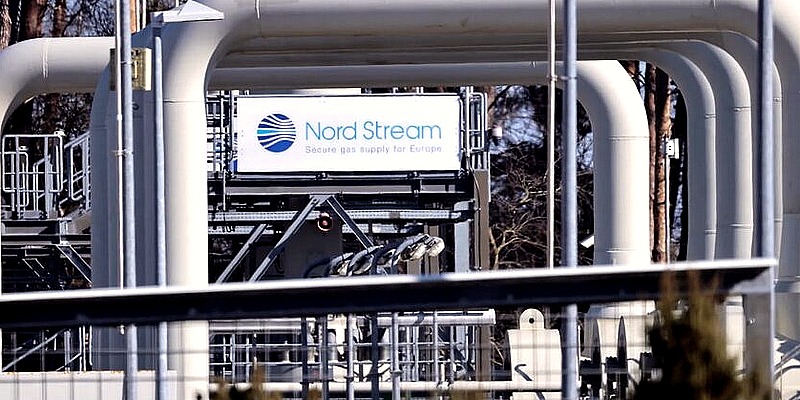
Germany braces for winter
A gas shutdown or sharply reduced flows would deal a severe blow to European economies, and few countries are as vulnerable as Germany.
Like its neighbours, the EU’s biggest economy has rushed to diversify energy suppliers, partly by buying more liquefied natural gas (LNG). But Germany still imports 35 percent of its gas from Russia, down from 55 percent before the war.
Fresh supply shocks would not only push already high gas prices even further, fanning inflation, but could force energy-intensive companies to shut down.
Germany would also struggle to fill up its gas storage tanks before the cold weather arrives if Nord Stream 1 does not come back online fully, raising the likelihood of energy rationing.
Economy Minister Robert Habeck has urged Germans to take shorter showers and turn down the heating this winter.
The International Monetary Fund has estimated a gas cut could shave 1.5 percent off Germany’s gross domestic product this year.
European solidarity?
Although experts say Germany is paying the price for its misguided policy on Russian energy, a crisis that tips the economic giant into a recession would reverberate beyond its borders.
Not least because Germany is a major re-exporter of Russian gas, including to Austria, the Czech Republic and Switzerland.
“A gas crisis in the European Union’s economic powerhouse will cause jitters across the continent,” says Constanze Stelzenmueller, a senior fellow at the Brookings Institution.
The European Commission on Wednesday urged EU countries to reduce demand for natural gas by 15 percent over the coming months to secure winter stocks and defeat Russian “blackmail”.
Germany could also appeal for EU solidarity in sharing out the fossil fuel.
“Already very high flows of gas are coming into Germany from Norway, also from Belgium and Netherlands,” says Ben McWilliams from the Bruegel Institute.
ADVERTISEMENT
ADVERTISEMENT






